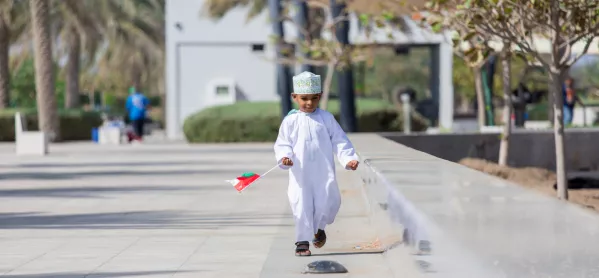- Home
- Coronavirus: 3 tips from a school in lockdown in Oman
Coronavirus: 3 tips from a school in lockdown in Oman

My British international school in Oman was required by the government to shut down completely from Sunday 15 March for at least a month. We thought it was coming, but it happened a few days earlier than expected.
We’ve had some wins, done a lot and learned much since. I want to share this with you, to help. We all need to actively swap notes about what has worked well, and where improvement is needed.
Looking after the wellbeing of our students is always our primary concern, and our task as teachers and role models is to help them, and their parents, to deal with these uncharted waters.
How to cope with coronavirus shutdown
So here’s my take on our first five days of shutdown.
1. Don’t let perfect be the enemy of good
Whatever you put in place will not be perfect from the start. But it’s much better to get on with it than to do very little or just to wait for everything to be finalised.
That’s what our strategy is, in a nutshell: implement, listen, learn, adapt. We needed to go, go, go into the new world of online learning without delay.
2. Communicate fully
Listen to what parents and students are saying about the shutdown. What does it mean to them? What are their fears? How can we best support them?
Internally, take care to listen to colleagues’ ideas and concerns. Our solution - to move learning away from a place where everyone gathers together at the same time, to a situation where everyone is learning individually, at home, with students dispersed through an entire city - is probably the biggest change in schooling since it was conceived.
If this weren’t challenge enough, we’re trying to do it at a time where we are facing the biggest public health crisis for at least 100 years, and that crisis is worldwide. So communicating our plans at the outset was critical.
We found initially that we were overwhelmed with questions. So we gathered them in two places. We set up a live document and gave all parents editing rights, to allow them to ask questions and give feedback. Our heads of school could then respond on the document for all parents to see.
And we set up forums for parents to ask questions of specific staff members, as well as to request password resets for the applications we run and ask for help with other technical issues.
3. Technology matters
We found that nearly 20 per cent of our teaching staff did not have a device at home on which they could manage online learning for their students. We also found some of our families did not have a device, or sufficient devices, to cover the need.
Secondary school
For schools not running a cloud-based system like G-Suite or Microsoft 365, the journey to e-learning will be much harder to achieve. We had made the move to G-Suite in late 2018, training our team and then providing all senior-school students with a Gmail account from 2019. This was a game-changer.
We had been somewhat nervous about creating such ease of communication between teachers and students, but guidelines and training helped to ease this concern. This meant that we were able, less than 12 hours following the decision to close, to enable all of our 1,286 students throughout the school to participate in e-learning straight away.
Our students have been both engaged and intrigued, and it has worked better than we could have hoped.
Primary school
For primary-school students, we are using one Google site per year group, with the lessons for the day posted by 3pm the previous day to allow parental support where necessary. We’ve learned that all students appreciate the video sessions - it helps them to feel part of something real.
We’ve also found that we’ve needed to help some of our teachers to make and upload videos for the G-Suite platform: some had never put one together and didn’t feel confident doing it.
We’ve now had quality videos in PE, drama, maths, English and PSHE, as well as stories for the younger students.
The teaching staff have found that they’ve missed the students, and the students miss us. An empty school is no school at all, so the videos really help us to stay connected. Social interaction is a necessary part of learning, but it is not possible just now.
Technology drain
There are some other issues we are still working around. For both students and teachers, being online for hours at a time is draining, and can bring levels of stress not experienced during the normal school day.
Parental support at home is something not all can provide without major disruption to their lives.
But home learning doesn’t have to be 100 per cent screen time. It can also comprise exercise, cooking, crafts, design projects, writing. Our teachers need time to plan, reflect and recharge.
This has been a time of considerable challenge, innovation and creativity. For me, it feels like the longest week in 30 years of education.
But seeing the photos of students learning from their homes has inspired us to do even more next week.
And seeing the dedication of my team to every single one of their students has been something I will remember for ever. It has been truly outstanding.
Kai Vacher is principal of the British School Muscat, in Oman
Keep reading for just £1 per month
You've reached your limit of free articles this month. Subscribe for £1 per month for three months and get:
- Unlimited access to all Tes magazine content
- Exclusive subscriber-only stories
- Award-winning email newsletters



